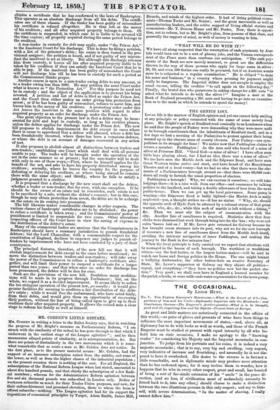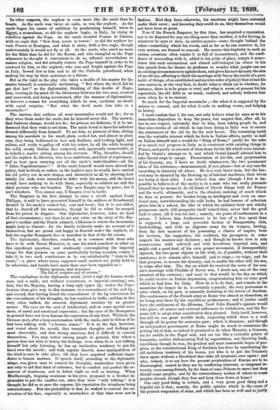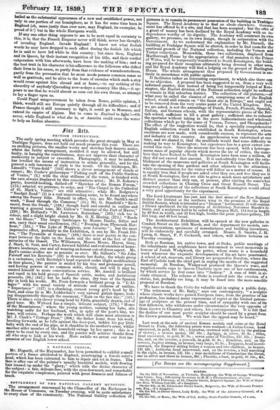THE OCCASIONAL.
By LEIGH HUNT.
No. V. TEE Faioca Emrssoa's 3fovorsata.— What is the Secret of it?— Corn parisons of him and his Uncle—Diplomatic Inquiries into the Moustache : and Conclusions thereon—The Emperor's Arribre-pensfes—What is to be thought, good and ill, respecting him and his Objects—Present State of Europe.
As great and little matters are notoriously connected in the affairs of this world,—as pairs of gloves and presents of wine have been things to influence the most important movements of states,—and, above all, as diplomacy has to do with looks as well as words, and those of the French Emperor must be studied at present with equal intensity by all who be- hold him on state occasions, I make no apology to the "knowing reader" for considering his Majesty and the Imperial moustache in con- junction. To judge from his portraits and his coins, it is indeed a very majestic moustache ; that is to say, very big and swelling, very august, very indicative of increase and flourishing, and assuredly he is not dis- posed to have it overlooked. His desire to the reverse is in fact not a little remarkable, and in diplomatic minds may produce more attention than he has reckoned upon ; for it may incline them to wonder, how it happens that he who in every other respect, great and small, has boasted of being a sort of fac-simile extension of his " uncle " in the peace di- rection, (and no less, if civilization must of melancholy necessity be forced back to it, into any other,) should choose to make a distinction between the two illustrious persons in this only respect; and say to him- self; with severe determination, "In the matter of shaving, I really cannot follow him." In other respects, the nephew is even more like the uncle than he boasts. As the uncle was twice an exile, so was the nephew. As the uncle began his career of ambition by proclaiming himself, when in Egypt, a mussulman, so did the nephew begin, in Italy, by rising in rebellion against the Pope. As the uncle invaded France at Cannes, with an eagle that "flew from tower to tower," so did the nephew in- vade France at Boulogne, and what is more, with a live eagle, though unfortunately it would not fly at all. As the uncle, who cared no more for the Bible than he did for the Koran, and who trampled on the Pope whenever he thought it convenient to do so, affected nevertheless to restore religion, and did actually restore the Pope himself in order to be crowned by him, so the nephew, who rose and fought against the Pope in Italy, bowed low to him and to all the Catholic priesthood, when making his way by their assistance to a throne.
But as the valet in the play who takes a double of his master for the master himself; is continually exclaiming, "But where the devil did he get that hat?" so the diplomatist, thinking of this double of Napo- leon, turning in his mind all the likenesses between the two men, avowed and unavowed, and being accustomed, after the manner of diplomatists, to discover a reason for everything which he sees, exclaims no doubt with equal surprise, "But what the devil made him take to a moustache ?"
The answer, that soldiers all wear moustaches would not do ; for so
they wore them under the uncle, but he himself never did. The answer, that fashions change, would not do ; for princes set fashions, if it be un- derstood that they wish to set them. The uncle loved to have his inferiors dressed differently from himself. To see him, in pictures of him, sitting among his marshals in his Mall, plain cocked hat, and almost as plain coat, they being bedizened in lace and feathers, and looking light, and salient, and ready to gallop off with his orders, he all the while keeping his solid, steady Italian face unmoved, and, apparently unmoveable, is to behold a master sitting among his servants. Why, therefore, should not the nephew do likewise, who is so ambitious, and fond of supremacy, and so bent upon carrying out all the uncle's individualties—all the "Ideas Napoleoniennes ? " If the uncle himself would have altered his policy, had he lived, or rather, as the nephew says he would, have carried his old policy out in new shapes, and astonished us all by showing how totally his ends were intended to differ with his means, still the beard would have nothing to do with them, especially as soldiers are still the chief persons who are bearded. The new Empire may be peace, but it isn't whiskers. You cannot say, L'Empire c'est la barbe.
The Emperor in his first attempt to raise a revolt against Louis Philippe, is said to have presented himself to the soldiers at Strasbourgh dressed in his uncle's cocked hat, coat and boots ; but it is not added, that he shaved off his moustache, though he did so when he escaped from his prison in disguise. Our diplomatist, however, takes no heed of that circumstance ; nor does he set any value on the story of the Em- peror's mother and the Dutch admiral, a likeness to whom the moustache might help to obscure : for the family evidently make no acoount of it themselves, but are proud and happy to flourish under the nephew, al- beit the regular Bonaparte face is manifest in that of the fat cousin.
The diplomatist, therefore, resolved, as is common with those who
have to do with Secret Histories, to ease his mind somehow or other on this significant question, and studiously contemplating the imperial visage for that purpose on some particularly trying occasion, comes, I take it, to two such conclusions as he can satisfactorily "state to his court,"—a place where many supposed small matters are justly held to be otherwise, and beards have more than once been regarded as—
"Hairy meteors, that denounce The fall of sceptres and of crowns."
The conclusions in the diplomatic mind, (with a sigh for human weak- ness, and a smile, not without resentment, at imperial cunning,) are, first, that his Majesty, having a long ugly upper lip, makes the Napo- leonian ideas give way in this instance to a concealment of the said lip ; and second, that having found the concealment of the lip convenient for the concealment of his thoughts, he has resolved to baffle, and has in fact very often baffled, the severest diplomatic scrutiny by no greater means. The eyes are the seat of intellectual, and on some special occa- sions, of moral and emotional expression ; but the eyes of the Bonapartes in general have not been famous for expression of any kind. Wieland, the German poet, after a long conversation with the uncle, said he felt as if he had been talking with "a bronze statue." It is in the lips, however, and round about the mouth, that transient thoughts and feelings are most observable, and that strong emotions find it difficult to conceal themselves. You may notice among people in general, that where a person does not wish to betray his feelings, even when he is not talking himself but only listening, he has an instinctive tendency to put his hand over his mouth ; and with regular knaves, some manipulation of the kind is sure to take place, till they have acquired sufficient impu- dence to brazen matters. If speech itself, according to the diplomatic adage, was given man to conceal his thoughts, mustachios were given not only to aid that kind of reticence, but to comfort and perfect the re- sources of dumbness, and to defeat sight as well as hearing. When Marlborough, feigning weakness in his eyes, proposed to a brother di- plomatist to put the candles out, since they were "only talking," it is thought he did so to save the expense, his reputation for stinginess being extraordinary. But the probability is that he wished to conceal the ex- pression of his face, especially as mustachios at that time were not in fashion. Had they been otherwise, his emotions might have retreated under their cover ; and knowing they could do so, they themselves would not have been so great.
Now if the French Emperor, by this time, has acquired a reputation not to be disputed for any one thing more than another, it is for having, in whatever he says or does, an arriere-pensee—some thought behind the other—something which his words, and as far as he can contrive it, his very actions, are framed to conceal. He carries this duplicity to such an excess, occasions often render it so full of inconsistency, and the confi- dence of succeeding with it, added to his pride of place, tempts it some- times into such unconscious and absurd self-betrayal (as where in his late speech from the throne he professes to wonder what people can see in existing circumstances to agitate them, and gives his new dynasty the airs of an old one, affecting to think the marriage with Savoy the result of a pure habit of things, of an established and ancient order of policy) that at last his own nation* at the very best, in doubt what to think (as to whether, for instance, there is to be peace or war) and what is worse at present for his reputation, the old fable is, as usual, realized, and nobody believes him even when he is in earnest.
So much for the Imperial moustache ;--for what it is supposed by the wearer to conceal, and for what it ends in making worse, and helping to betray.
I must confess! that I, for one, not only believe what he says as to his immediate disposition to keep the peace, but suspect that, after all, he has in one respect, extremely dear to him, been taking people in, and that nine-tenths of all which he has been doing in Italy was to secure the attainment of the old tie for the new house. The remsining tenth was the veritable interest which he feels in Italian affairs, partly as half an Italian himself and a would-be "King of Rome," partly for the sake of as much real progress in Italy as is consistent with existing things in France, and partly on account of those fears for his life which were intensi- fied by Orsini's attempt on it, and which Orsini hmself advised him to take liberal steps to escape. Preservation of his life, and perpetuation of his dynasty, are, I have no doubt whatsoever, the two paramount ideas of his existence,---monomaniacal, if you please—but at any rate far exceeding in intensity all others. He is a very brave man, but the bra- vest may be daunted by the blowing up of infernal machines, their wives too being at their sides. I can believe him also (though I feel it im- possible to believe it of the uncle) to be a man who can really persuade himself that he means to do all kinds of liberal things both for France and the world, ultimately, and to the absolute undoing of much which he does at present: for besides being an intelligent and even an emo- tional man, notwithstanding his cold looks, he had lessons of reflection given him in a school, the like of which the military-bred and wholly prosperous uncle (till prosperity itself ruined him) never had the good luck to enter, till it was too late ; namely, six years of confinement in a prison. I believe him furthermore to be less of a free agent than is supposed, a large and powerful faction of Bonapartists, rich, land-holding, and with an Algerine army for its weapon, having, from the first moment of his possessing a chance of empire, been his inviters, his supporters, his creditors, his prompters, in some respects his masters and dictators ; and though he knows how to mix acquiescence with self-will and with hereditary imperial airs, and might risk a good deal, of his own proper movement, if disrespectfully opposed, his two great objects in life with, or, if possible, without their assistance, is to remain alive himself, and to reign ;—to reign, and for that purpose, to secure his dynasty, and so enable his other self, his son, to reign after him. The day on which he received the news of his con- sin's marriage with Clotilda of Savoy was, I doubt not, one of the very sweetest of his existence; and next to that would be the day on which he could receive an Italian deputation, congratulating him on some good which he had done for Italy. /low he is to do that, and remain in the meantime the despot he is, is certainly a puzzle, the very pretension to solve which, on his part, is naturally irritating to the lovers of freedom. His continuance of the French army at Rome was almost as shameless, as its being sent there by his republican predecessors ; and if justice could have the settlement of the dilemma, Lord John Russell's opinion would take place, all armies and external influences be withdrawn, and the Ro- mans left to adopt what constitution they pleased. Italy itself, however, has still its one great terrible fault, respecting which there is a wail through all its poetry for centuries past; which is disunion ; and though an independent government at Rome might do much to commence the getting rid of that, as indeed it promised to do when Mazzini, a Genoese, sat for awhile in the Papal seat, and sat too like a veritable prince of humanity, neither dishonouring God by superstition, nor throwing back, republican though he was, the gentlest and most reasonable hopes of pro- gress, as the constitutional King of Sardinia has done by manifesting the old ambitious tendency of his house, yet who is to put the Triumvir there again without a bloodshed that risks all tyrannies over again? and who, indeed, is to say how the present perplexities of Europe are to be disentangled, caused as they are by conflicting interests, or supposed in- terests, even among friends, by the fears of some Princes to move lest they should rouse peoples, and by the extraordinary wishes of others to rouse peoples abroad, though they fear and keep them down at home? One only good thing is certain, and a very great good thing and a hopeful one is that; namely, the public opinion which is the cause of the present suspension of arms, and which has been so well and so justly
hailed as the substantial appearance of a new and established power, not only in one portion of our hemisphere, as it has for some time been in England (oh, more justly than ever now, may England, its exemplar, be proud of it !) but in the whole European world.
If any one other thing appears to me to be next equal in certainty to this, it is, that the French Emperor never will think, never has thought, of invading England. Invade England! I know not what foolish words he may have dropped to such effect during the foolish life which he is said to have led while in this country ; but since then, England and its Queen, by their instant recognition of his title, and their cordial cooperation with him afterwards, have been the making of him; and as the best trait in his character is his adherence to the followers who risked their lives in his cause, so partly from that evidence of warmheartedness, partly from the persuasion that he must needs possess common sense as well as gratitude, and be alive to the hosts of enemies which such a step would rouse against him abroad and at home,—to say nothing of the absurdity of anybody'slinvading now-a-days a country like this,—it ap- pears to me that he would almost as soon cut his own throat, as attempt to lay a finger upon us.
Could Papal misgovernment be taken from Rome, public opinion, I think, would still see Europe quietly through all its difficulties; and if France thought it still necessary to fight, it could go to Morocco, and extend its empire of Algiers. But to come to .England to fight !—Oh never, while England is what she is, or America could cross the water to help an Indian absentee.




































 Previous page
Previous page